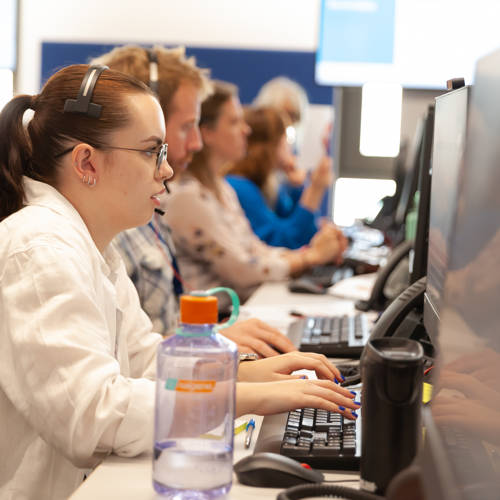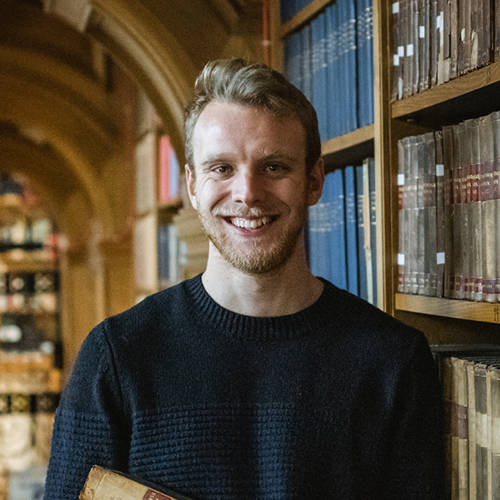Overview
Get ready with a foundation year and learn the foundational skills and knowledge to complete a full Honours degree. You'll be able to embark on this qualification without meeting the level 3 entry requirements, giving you the opportunity to study at degree level through this four year course.
Unlock the science behind human performance with a Sport and Exercise Science degree from Canterbury Christ Church University. If you’re passionate about sport, health, and the science that drives elite performance and wellbeing, this course is your next step.
Taught by expert staff in our cutting-edge labs and training facilities, you'll explore how the body and mind respond to physical activity. You’ll gain hands-on experience with the latest sport science technology and develop practical, professional skills that are highly valued in careers across sport, health, fitness, and exercise science.
What you’ll learn
- Explore a range of topics, from anatomy to sociology.
- Analyse human movement and performance as you learn the scientific techniques involved in biomechanics.
- Apply psychology to understand motivation, behaviour, and the impact of cognition and emotion.
- Develop research skills to investigate key topics in sports science, fitness and health.
- Train in real-world environments to build the practical and communication skills needed for careers in sports coaching, personal training, and health promotion.
- Gain an appreciation of the social structures, cultural influences, group dynamics and interactional encounters that enhance and restrict participation and enjoyment in sport, exercise, and physical activity.
Whether you’re aiming to become a sport scientist, work in elite performance, or support public health through physical activity, this degree will equip you with the knowledge and experience to make a real difference. You’ll graduate ready for the workplace or further study, with a strong foundation in the science of sport and exercise.
The topics taught on the course inspired me. I went on to work in Boccia for the team GB Paralympic team and am now a physiotherapist for the NHS. I have immense gratitude for my studies for enabling me to undertake such opportunities.AshleeStudent
Why study Sport & Exercise Science at CCCU?
- Select your qualification
- Select your grade
- Add it and repeat
Accepted qualifications
We accept a wide range of general qualifications that attract UCAS Tariff points either on their own or in combination with others. Below are some common examples.
| Qualification | Grades |
|---|---|
| A Levels | DDE |
| BTEC | MPP |
| Access | Pass 45 Credits |
| International Baccalaureate | TBC |
More information
Contact us
Module information
As well as the core modules, you may also have the opportunity to study a number of option modules. Option modules will not be pre-selected for you. We provide examples of option modules. The availability of specific option modules may vary from year to year. The offer of an option will be subject to a minimum number of students choosing the module to ensure the appropriate student experience. The offer of option modules may also be affected by staff availability. It means we cannot guarantee the availability of a particular optional module. However, we will ensure you have a choice of option modules.
Core/optional modules
How you’ll learn
In your Foundation Year, you will be introduced to higher education with a range of supportive modules that prepare you for study in higher education and familiarise you with the core knowledge and skills of your chosen subject.
Your course will include a mix of in-person and virtual lectures, seminars, practical sessions, labs, workshops, and tutorials. Smaller group seminars and tutorials will provide opportunities to discuss and deepen your understanding of the material covered in lectures and other sessions.
Additionally, you will have regular meetings with your personal academic tutor to support your academic journey.
When not attending lectures, seminars, workshops, or other scheduled sessions, your learning will continue through independent study. This typically includes both guided tasks and self-directed activities such as reading journal articles and books, conducting library research, working on projects, and preparing for workshops, seminars, coursework, and exams. This work should amount to approximately 3-5 hours per week for each module you are enrolled in.
Each module tutor will guide you toward specific readings and activities to complete before and after class to enhance your learning and development. Additionally, your personal academic tutor will assist you in reviewing your performance and support your independent learning.
Your overall workload typically consists of 60 credits of study across modules each semester, equating to 12 direct taught contact hours per week. You will also undertake 15-20 hours of independent learning and assessment related activity each week.
The teaching team consists of highly qualified academics, supported by a skilled technical and administrative team. They have a range of expertise and experience across the breadth of disciplines in science generally, teaching pedagogy and sport and exercise science specifically.
The majority of staff hold the highest academic qualification (doctorate), with a small number of staff working towards achieving this standard. Across our section, staff are actively working in applied science with external partners and are research-active, many of whom are at the forefront of their research fields in the UK and beyond. They have substantial experience in using these skills and experiences in delivering research led and research informed teaching.
Postgraduate students sometimes assist in teaching and assessing some modules. However, experienced academics teach the vast majority of lectures and seminars.
Our course is taught through practical, theoretical and experiential sessions, during which students will develop theoretical, analytical, practical, and transferable skills.Dr Mathew BrownSport & Exercise Science Course Director
How you’ll be assessed
This Sport and Exercise Science course frequently provides you with opportunities to test your understanding of the subject informally before you complete the formal assessments that count towards your final mark. Many modules contain practice, or formative assessments, or similar submissions for which you receive feedback from your tutor. Formative or practice assessments and submissions are developmental and any grades you receive for them do not count towards your module mark.
The formal, or summative, assessments on each module are planned to take account of two interdependent aspects - the acquisition of relevant theory/principles, and the development of both academic and practical skills.
Assessment methods include a range of coursework assessments such as essays, reports, portfolios, presentations, your final year project (dissertation), and written examinations. The grades from formal assessments count towards your module mark.
Your future career
Our Sport and Exercise Science degree opens roles in sport, physical activity and health, administration and research, and health and fitness publishing, as well as the expanding leisure industry.
In addition, it provides an excellent foundation for careers in the public sector, including the medical professions (cardiac rehabilitation, physiotherapy, health promotion, and medical sales), whilst both the armed and police forces have looked favourably upon our graduates.
Wherever your career aspirations lie, a Sport and Exercise Science degree will equip you with both the specific and generic knowledge and skills that may provide that essential ‘edge’ when trying to make a mark in today’s competitive job market.
Successful completion of the degree will also open up routes into teaching, such as a PGCE (Physical Education) and prepares you for further postgraduate study at all levels through to PhD.
CCCU gave me a chance – they saw my potential based on the skills and experience I’d gained in the Marines. Now four years later, with a degree and MSc in Exercise Physiology, I’m about to start a PhD.HarrySport & Exercise Science Instructor
Related courses
Fees
Tuition Fees for 2026/27 have not yet been finalised. These course web pages will be updated with Tuition Fee information once they have been agreed.
- Read advice about funding your degree
- See information about the financial support available for undergraduate studies
- If you would like information about paying your fees, please contact accounts.receivable@canterbury.ac.uk
- For specific fee queries, please contact fees@canterbury.ac.uk
Regulated by the Office for Students
The Office for Students (OfS) regulates Canterbury Christ Church University. The OfS is the independent regulator of higher education in England. It aims to ensure that every student, whatever their background, has a fulfilling experience of higher education that enriches their lives and careers. Further details about its work are available on the OfS website.
Apply now
Duration:
4 yearsUCAS code:
C608Location(s):
CanterburyFind out more
Sign up to hear the latest from the University, including upcoming events, useful updates, student life and more!
*We are advertising this course as ‘subject to approval.’ When we add new courses or update existing courses, we advertise the course as ‘subject to approval’. We do this to let you know the University still needs to agree to run the course. It is rare for a course not to gain approval, but it is not guaranteed. There may be changes to course and module titles, content and assessment, but we will tell you about these if there is a change. You can still apply to study a course subject to approval. We have prepared some questions and answers to tell you more.





